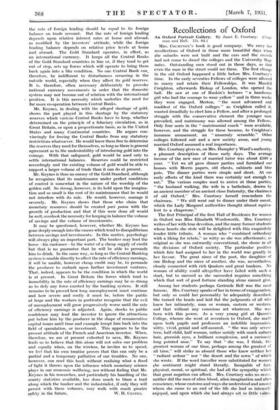Recollections of Oxford
MRS. COURTNEY'S book is good company. We envy her recollections of Oxford in those more beautiful days when the suburbs were not built and the cars and the crowds had not come to dwarf the colleges and the University Mag- nates. Outstanding men stood out in those days, so that even the man in the street could see them. The first change in the old Oxford happened a little before Mrs. Courtney's time. In the early seventies Fellows of colleges were allowed to marry and retain their Fellowships. It was Mandell Creighton, afterwards Bishop of London, who opened the ball. He saw at one of Ruskin's lectures " a handsome girl who had the courage to wear yellow " and in three weeks they were engaged. Merton, " the most advanced and maddest of the Oxford colleges " as Creighton called it, wanted dreadfully to elect him a Fellow, and after a prolonged struggle with the conservative element the younger men prevailed, and matrimony was allowed among the Fellows. Only four seats in the " matrimonial coach " were available, however, and the struggle for these became, to Creighton's immense amusement, an " unseemly scramble." Other colleges followed suit and a new society arose, and young married Oxford assumed a real importance.
Mrs. Courtney gives us, on Mrs. Humphr-y Ward's authority, a pleasant description of those early days. The average income of the new race of married tutor was about £500 a year. " Yet we all gave dinner parties and furnished our houses with Morris papers, old chests, cabinets and blue pots. The dinner parties were simple and short. At our early efforts of the kind there was certainly not enough to eat." The various couples used to arrive at these parties, " the husband walking, the wife in a bathchair, drawn by an ancient member of an ancient close fraternity, the chairmen of old Oxford." Mrs. Courtney herself remembers the chairmen. " We still went out to dinner under their escort, which the Lady Margaret authorities thought almost equiva- lent to a chaperone."
The first Principal of the first Hall of Residence for women in Oxford was Miss Elizabeth Wordsworth. Mrs. Courtney writes of her with true devotion, and the many former students whose hearts she stole will be delighted with this exquisitely tender little tribute. A woman who " combined orthodoxy with a liking for rebels," as witty as she was affectionate, as original as she was outwardly conventional, she shone in all the divisions of Oxford society. The particular position which fate had assigned to her in the world was greatly in her favour. The great niece of the poet, the daughter of one Bishop and the niece of another, she was, nevertheless, closely connected with rich Quakers and great bankers. No woman of ability could altogether have failed with such a start, but to succeed as she succeeded requires something which that sort of good fortune standing alone cannot give.
Among her students perhaps Gertrude Bell was the most famous. Mrs. Courtney speaks of her in terms of exaggeration, but only so could her personality be adequately described. She turned the heads and laid flat the judgments of all who knew her intimately, man or woman, eastern or western, and that without any conscious art whatever. She was born with this power. As a very young girl at Queen's College, whence she went at seventeen to Oxford, she made upon both pupils and professors an indelible impression, witty, vivid, genial and self-assured. " She was only seven- teen, half child, half woman, rather untidy with much auburn hair, greenish eyes, a brilliant complexion, and a curiously long pointed nose." To say that " she was, I think, the greatest woman of our time, perhaps among the greatest of all time," will strike as absurd those who knew neither her
radiant ardour " nor " the desert and the sown " of which she wrote. If the word traveller were substituted for woman the sentiment might stand literally. Incapable of fear, physical, moral, or spiritual, she had all the sympathy which that great negation can afford. Mrs. Cour tneynslcs no more, neither did the men of alien blood, alien imagination and alien conscience, whose customs and ways she understood and anion; whom she came to an end of the life she had so intensely enjoyed, and upon which She had always set so little value.


























































 Previous page
Previous page